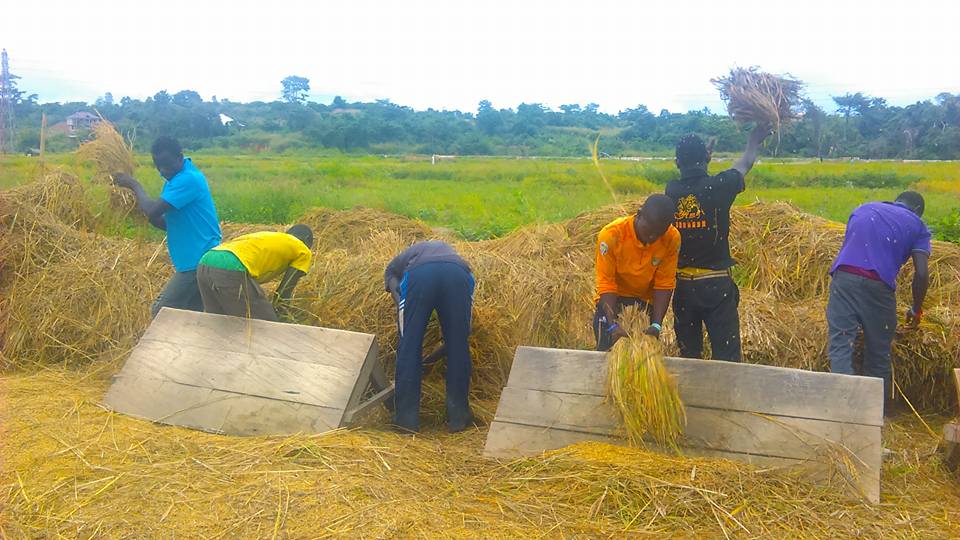 Former President John Agyekum Kufuor has commended the Alliance for a Green Revolution in Africa (AGRA) for its commitment to the development of Ghana and Africa’s agriculture.
Former President John Agyekum Kufuor has commended the Alliance for a Green Revolution in Africa (AGRA) for its commitment to the development of Ghana and Africa’s agriculture.
The former president who is founder of the John A. Kufuor Foundation described AGRA as an “instrumental partner with whom we share common goals and aspirations.” He expressed “sincere appreciation to the entire AGRA outfit for their tireless commitment to transforming the agricultural sector across the whole African continent.”
“It is truly historical for an African-led organization like AGRA to champion the continent’s agricultural revolution. We envisage several areas of collaboration in the coming future to totally transform our dear continent,” the former president noted.
The former president was speaking in an interview following a courtesy call on him by board chairman of AGRA and former Ethiopian Prime Minister H.E. Hailemariam Desalegn.
The Foundation and AGRA have been rolling out a number of initiatives to accelerate growth of Ghana’s agricultural sector, make the country less dependent on food imports, and reduce poverty among farmers.
The latest such initiative is themed: “Public – Private Partnership for Competitive and Inclusive Rice Value Chain Development: Planting for Food and Jobs – Rice Chapter.” The project is promoting efficient strategies and policies that will make Ghana self-sufficient in rice production, so the sector provides the associated jobs and economic growth.
Ghana spends an average of US$600 million annually importing rice. In fact, in 2015, it was US$1.2 billion. That figure is close to the entire foreign exchange Ghana earns annually from its most important cash crop, cocoa. Rice imports are also destroying local jobs within the sector. But the AGRA–John A. Kufuor Foundation project is helping turn the untenable situation around.
The project has reorganized players in the rice sector into a more formidable national association under the umbrella of the Ghana Rice Interprofessional Body, to be able to advocate and lobby on behalf of rice farmers and other value chain actors. Chapters of the association have been established across the 16 regions of the country which have become efficient channels for the distribution of inputs and subsidies to farmers.
Through the project, a number of reputable institutions with expertise in the areas of infrastructural development and technical support have been mobilised to help foster value chain linkages and increase private sector capital investments in the sector. Key in such efforts is the consortium comprising InterValle, Hopeline Institute, Sparkx Farms, Volta City Farms and the Ministry of Food and Agriculture, working together with the Foundation.
One other success the project has chalked is the creation of market linkages between farmer groups and structured markets, including listing rice on the Ghana Commodities Exchange. The move is helping ensure rice farmers get reliable and sustainable market for their produce.
These ongoing developments, as explained by former President Kufuor, “is in keeping with the spirit of our bond with AGRA where we always seek to leverage on or consolidate the numerous opportunities in Ghana.” “The aspiration is to build a sustainable marketing opportunity for our rice farmers to secure optimum prices for their efforts and also contribute to the growth of the commodity exchange,” he added.
An important part of the project is the “Eat Ghana Rice” campaign rolled out to drum up support for the local rice industry. The public sensitization efforts have received favorable response and is yielding results, as shown in the increasing consumption of local rice.
The John A. Kufuor Foundation – AGRA collaboration has also been instrumental in bringing importers and local rice producers to the negotiation table to deliberate on how to empower local rice producers. The resulting agreement will see the importers sourcing a substantial part of their supplies locally for the benefit of Ghanaian farmers. Three importers have since launched local rice brands as a result of the project’s advocacy.
The review of the “National Rice Development Strategy 2020 to 2030” is another important outcome of the collaboration. The Foundation supported the Ministry of Food and Agriculture to undertake the review to ensure that the country becomes self-sufficient in rice production. Advocacy activities under the project have also resulted in government establishing a Rice Fund into which money will be invested for the benefit of players in the rice value chain.
“Our partnership with AGRA is primarily focused on achieving import substitution through creating a self-sufficient rice sector that can compete favorably with the imports… If we get our strategies right, we could become a net exporter of rice very soon,” former President Kufuor noted.
The outcomes of the John A. Kufuor Foundation – AGRA partnership have benefited other African countries as well. Support has been given to the Economic Community of West African States (ECOWAS) Rice Offensive Initiative, which was launched in 2014. The initiative seeks to help the sub-region to realize its full potential and consumption needs in rice production. Sounding optimistic, President Kufuor stressed, “we have been actively mobilizing all West African countries to leverage on ECOWAS Rice Offensive and help develop the value chain along the sub-region.”
On what the future holds, President Kufuor said his Foundation and AGRA will continue to work towards building partnerships with private institutions so more capital can be made available to players within the rice value chain.
“Both organizations believe immensely in the power of partnerships. We have continually built a broad coalition of partners at different levels of the value chain. A key partner that needs to be brought on board is the financial intermediaries to make available funding for the sector… I believe both the Foundation and AGRA can develop a credible strategy in furtherance of increasing access to finance for farmers,” the former president concluded.





